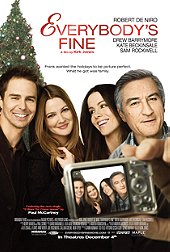The movie is about a widower who has two sons and two daughters, all of whom are in their late 20s and early 30s, and all of whom had a much better connection with their mother. So, now that she has passed away, Frank (Robert De Niro) is trying his best to reach out to his four "kids" and get back in touch with them, which will be even harder due to the fact that they all live in different hometowns. It turns out that all four of them are unable to come visit their dad at home, so Frank decides to get on a bus and go visit each of them individually. EVERYBODY'S FINE focuses on Frank's interaction with each of his sons and daughters as he visits each one, and we notice that all of them have been somewhat dishonest towards their father in terms of what they're doing with their lives. This is the perfect setup for a great dramedy. Why doesn't it work?
Ironically, the most important aspect of the story (which is the one that is supposed to exert the toughest emotional blow at the end) is what hurts the film the most. Frank's first visit is to his son David. Unfortunately, David is nowhere to be found, so Frank moves on to visit his other son, Robert (Sam Rockwell) and his two daughters, Amy (Kate Beckinsale) and Rosie (Drew Barrymore). As Frank starts visiting them, we hear telephone conversations between the three siblings in which we discover that David was arrested for drugs in Mexico, and the three siblings all tell each other that it's VERY important that they don't tell their dad about this. The reason why this is a flaw when it comes to the film's effectiveness is because it renders Frank's visits to each of these three characters WAY shorter than they should be. The FASCINATING thing about the scenes in which Frank visits each of the three of them is the way in which they all tell their father half-truths about what they've accomplished in life; what is NOT fascinating about these scenes is how the David issue feels like such an inserted contrivance that is meant to up the stakes. The David issue interrupts what had the potential to be GREAT, dramatic, dialogue-based scenes.
It would've been infinitely better for the film's SOLE focus to be on the struggles of Amy, Robert and Rosie in hiding certain aspects of their lives from their father, and for each of the visits to be far longer than they were. Each time that Frank left a hometown, I got this deflating feeling that things had only been explored superficially and that much more could've been done here. As Frank leaves each of the hometowns, it feels like such a disappointment that we didn't get to see more of Amy's at-home problems with her son and her husband, Robert's struggles with his musical aspirations, and Rosie's dubiously splendid apartment. The WORST thing about this is that the answers to all of these questions are then provided haphazardly towards the end of the film during an ostensible dream sequence in which the "child versions" of Amy, Robert and Rosie reveal everything to their dad, but this just feels like an awfully easy way for the film to tie everything up at the end, rather than having explored it on a deeper level during each of Frank's visits.
The fact that EVERYBODY'S FINE could've worked so well yet doesn't bothers me especially because this could've been a movie that I could've connected with very easily on a personal level. I'm sure a lot of other people have experienced this, but I, too, have felt compelled to tell half-truths to my parents on occasions, sometimes to give them peace of mind, other times perhaps to impress them more than I deserve. The half-truths I've told don't go quite as far as what these three characters tell their dad in this film, but there's no doubt that it's a plot that could've easily kept me very much engrossed. It's also a shame because the cast is fantastic, particularly Robert De Niro and Kate Beckinsale. The script's need to reiterate its title in the final line that is spoken before credits roll is totally manipulative and unnecessary, but perhaps it's good in the sense that the title's second word pretty much sums up the film's quality. It's just fine. And I wouldn't normally have a problem with that, except that this had the potential to be so much more than that.
5/10
 Login
Login